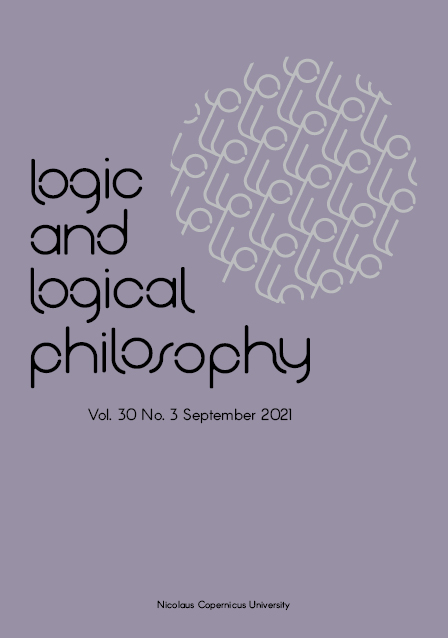A Syntactical Analysis of Lewis’s Triviality Result
DOI:
https://doi.org/10.12775/LLP.2021.006Keywords
conditionals, conditional probability, Stalnaker’s Thesis, triviality, collapse of modalitiesAbstract
The first part of the paper contains a probabilistic axiomatic extension of the conditional system WV, here named WVPr. This system is extended with the axiom (Pr4): PrA = 1 ⊃ □A. The resulting system, named WVPr∗, is proved to be consistent and non-trivial, in the sense that it does not contain the wff (Triv): A ≡□A. Extending WVPr∗ with the so-called Generalized Stalnaker’s Thesis (GST) yields the (first) Lewis’s Triviality Result (LTriv) in the form (◊(A ∧ B) ∧◊(A ∧ ¬B)) ⊃ PrB|A = PrB. In §4 it is shown that a consequence of this theorem is the thesis (CT1): ¬A ⊃ (A > B ⊃ A ⥽ B). It is then proven that (CT1) subjoined to the conditional system WVPr∗ yields the collapse formula (Triv). The final result is that WVPr∗+(GST) is equivalent to WVPr∗+(Triv). In the last section a discussion is opened about the intuitive and philosophical plausibility of axiom (Pr4) and its role in the derivation of (Triv).
References
Bradley, R., and N. Swartz, 1979, Possible Worlds. An Introduction to Logic and its Philosophy, Blackwell.
Eagle, A., 2005, “Probability, modality and triviality”. Internet Resource: http://fitelson.org/few//few_05/eagle.pdf
Fattorosi-Barnaba, M., and G. Amati, 1987, “Modal operators with probabilistic interpretations”, Studia Logica 46 (4): 383–393. DOI: https://doi.org/10.1007/BF00370648
Holliday,W., and T. Icard, 2014, “Modal probability logic”. Internet Resource: https://philosophy.berkeley.edu/file/922/lecture4part2.pdf and http://web.stanford.edu/~icard/esslli2014/lecture2.pdf
Kratzer, A., 2012, Modals and Conditionals, Oxford University Press.
Lewis, D.K., 1973, Counterfactuals, Blackwell.
Lewis, D.K., 1986, “Probabilities of conditionals and conditional probabilities”, The Philosophical Review 85 (3): 297–315. DOI: https://doi.org/10.2307/2184045
Maksimović, P., 1983, “Development and verification of probability logics and logical frameworks”, Université Nice Sophia Antipolis, 2013. https://tel.archives-ouvertes.fr/tel-00907854/file/2013NICE4074.pdf
Montanaro, A., and A. Bressan, 1981, “Contributions to foundations of Probability Calculus on the basis of the Modal Logical Calculus MCν or MCν∗, Rendiconti del Seminario Matematico della Università di Padova 64: 109–126.
Nute, D., 1981, Topics in Conditional Logic, Reidel.
Ognjanović, Z., M. Rašković and Z. Marković, 2009, Probability Logics, Mathematical Institute of the Serbian Academy of Sciences and Arts, Belgrade. Also: Probability Logics. Probability-Based Formalization of Uncertain Reasoning, Springer, 2016. DOI: https://doi.org/10.1007/978-3-319-47012-2
Pizzi, C.E., 1990, “Stalnaker-Lewis conditionals: Three grades of holistic involvment”, Logique et Analyse 33 (31): 311–329.
Pizzi, C.E., 2020, “Explicit conditionals in the framework of classical conditional logic”, Logic and Logical Philosophy 29 (2): 161–187. DOI: https://doi.org/10.12775/LLP.2019.030
Rescher, N., 1963, “A probabilistic approach to modal logic”, Acta Philosophica Fennica 16: 215–226.
Stalnaker, R.C., 1968, “A theory of conditionals”, pages 98–112 in N. Rescher (ed.), Studies in Logical Theory, Blackwell 1968.
Stalnaker, R.C., 1970, “Probability and conditionals”, Philosophy of Science 37 (1), 64-80. DOI: https://doi.org/10.1086/288280
Stalnaker, R.C., 1976, “Letter by Stalnaker to van Fraassen”, pages 302–306 in W.L. Harper and C.A. Hooker (eds.), Foundations of Probability Theory, Statistical Inference and Statistical Theories of Science, vol. I, Dordrecht: D. Reider Publishing Company.
Veltman, F., 1976, “Prejudices, presuppositions and the theory of conditionals”, pages 248–281 in J. Groenendijk and M. Stokhof (eds.), Amsterdam Papers in Formal Grammar, Vol. 1, Universiteit van Amsterdam: Centrale Interfaculteit.
Downloads
Published
How to Cite
Issue
Section
Stats
Number of views and downloads: 1115
Number of citations: 0







